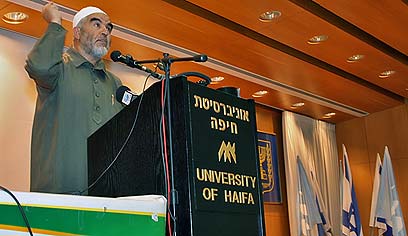
Islamic leader banned from Haifa Uni event
Haifa District Court upholds decision to exclude Sheikh Raed Salah from event, saying his presence endangers public safety
Sheikh Raed Salah, the leader of the northern branch of the Islamic Movement in Israel, will not participate in a Haifa University event because his presence poses "a likely danger to the public," the Haifa District Court ruled Monday.
The court denied an appeal submitted by the Arab student group A'akra to overturn the university's decision to forbid Salah's attendance.
Members of A'akra, which is associated with the Islamic Movement, invited Salah and other public figures to participate in an event that is set to take place this coming Wednesday under the title "Racism and Discriminating Laws."
Violent incidents broke out during Salah's previous visit to the school - incidents that according to the university "nearly led to bloodshed and harmed the complex fabric of the relationships on campus." For this reason, the university decided to exclude Salah from the A'akra's event.

Salah at Haifa University (Archive photo: Shai Vaaknin)
Another reason that the university cited was "his behavior on different occasions which was defined by the Supreme Court recently as an attempt to incite hatred and tension, and as proof of his determination to use his influence on his followers to inflame dissention."
Moreover, the university claimed that the proximity of the event's date to Remembrance Day and Independence Day were also contributed to the decision.
'Ban violates freedom of expression'
Ibrahim Khatib, who heads the A'akra group, appealed the university's ban, claiming that it is illegal and violates the freedom of expression.
"The freedom of expression is an important principle in a democratic state, and the university must protect it especially when it comes to unusual and angering opinions," Khatib said.
Judge Yitzhak Cohen rejected Khatib's petition, explaining that while the freedom of expression is a supreme value, it can be limited when there is the likelihood the public is in danger. The judge ruled that "the university has the authority to ensure orderly daily activity on its campus."
Judge Cohen criticized Haifa University for its inability to teach its students the tolerance to hear unusual opinions. He also slammed the student group's choice of inviting Salah to purposefully "ignite the sprits in order to leverage its weight among student groups on campus."
Haifa University President Aaron Ben-Ze'ev said that he assigns great importance to the fact that "especially on this day, the Remembrance Day for Israel's Fallen Soldiers and Victims of Terrorism, the court rejected the petition, supported the university's decision and asserted that it was proportional and reasonable."
- Follow Ynetnews on Facebook










